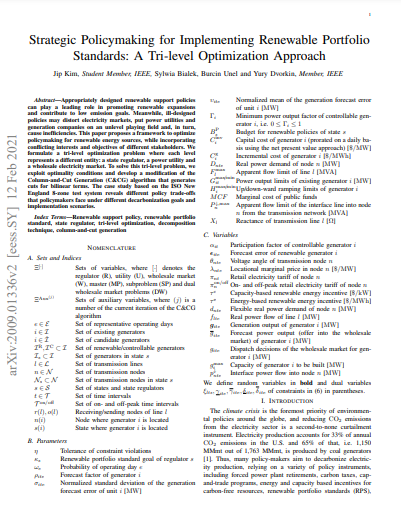-
Comments to NYISO on Buyer-Side Mitigation Reforms
In a recent presentation, the New York Independent System Operator (NYISO) posed key questions related to potential buyer-side mitigation reforms. We submitted comments that provide three recommendations to NYISO.
-
Comments to SEC on Climate Change Disclosure
Climate change presents grave risk across the U.S. economy, including to corporations, their investors, the markets in which they operate, and the American public at large. The Securities and Exchange Commission (SEC) recently requested public input on climate change disclosures, posing several questions related to the development of new disclosure regulations and the enforcement of existing regulations. We worked with several partners to submit comments to the SEC, providing 15 major recommendations.
-
Policy Integrity and Partners Form New Initiative on Climate Risk and Resilience Law
As the climate crisis intensifies, it is crucial that policymakers strengthen protections from the dangers of climate change to our nation’s financial system and the millions of people who rely on it to sustain the American economy. The Institute for Policy Integrity, alongside several partners, has founded the Initiative on Climate Risk and Resilience Law to advocate for smarter policies on this issue.
-
Comments to EPA on Proposed Rescinding of Clean Air Act Benefit-Cost Rule
In May, EPA announced its intention to rescind a 2020 rule entitled "Increasing Consistency and Transparency in Considering Benefits and Costs in the Clean Air Act Rulemaking Process." Policy Integrity submitted comments in support of this decision based on the view that the 2020 rule is unnecessary, unsupported by any evidence of need, and inconsistent with best practices for cost-benefit analysis. We attached joint comments that Policy Integrity submitted during the original rulemaking which made these arguments in addition to demonstrating specifically how the rule broke from cost-benefit best practices by (1) devaluing indirect benefits, (2) subjecting benefit calculations to stricter standards than cost calculations, and (3) raising the bar for evidence of causality in a manner that excludes studies highly significant to EPA’s cost-benefit analysis.
-
Comments to New Jersey on Solar Incentives
The New Jersey Board of Public Utilities (BPU) released a straw proposal for its Solar Successor Program. We submitted comments addressing a question about solar projects' potential benefits to environmental justice (EJ) communities. Our comments encourage BPU to consider the inclusion of an environmental justice adder and reommend that BPU explore an adder that would deliver material benefits to EJ communities.
-
Comments to FERC on Natural Gas Infrastructure
The Federal Energy Regulatory Commission (FERC) issued a notice of inquiry on how to revise its policy on certifying the construction and operation of interstate natural gas transportation facilities. We submitted comments providing numerous recommendations for how FERC can improve its evaluation of environmental impacts and methodology for determining whether there is need for a proposed project.
-
Comments to DOE on Process Rule for New Energy Conservation Standards
The Department of Energy proposed revisions to its procedures and policies for considering new energy conservation standards across a range of consumer products and commercial equipment. We submitted comments offering support for the proposed revisions and making additional recommendations. Our recommendations include weighing a full range of environmental and consumer effects, incorporating the consideration of distributional justice, and reviewing the selection of discount rates.
-
Comments on Greenhouse Gas Emission Offsets from Rail Tie Wind Project
The Rail Tie Wind Project would offset approximately 900,000 metric tons of carbon dioxide emissions annually compared to typical U.S. electric generation. We submitted comments encouraging the Western Area Power Administration to provide context for those emission offsets by using the social cost of greenhouse gases.
-
Comments to Maryland PSC on Energy Storage Report
The Maryland Public Service Commission requested input on its working group's energy storage report. We submitted comments in support of several of the working group's recommendations. We also encourage the Commission to apply the same principles that inform the report to assess the net emissions impacts of energy storage installations.
-
Strategic Policymaking for Implementing Renewable Portfolio Standards: A Tri-level Optimization Approach
Forthcoming
Appropriately designed renewable support policies can play a leading role in promoting renewable expansions and contribute to low emission goals. Meanwhile, ill-designed policies may distort electricity markets, put power utilities and generation companies on an unlevel playing field and, in turn, cause inefficiencies. This paper, forthcoming in IEEE Transactions on Power Systems, proposes a framework to optimize policymaking for renewable energy sources, while incorporating conflicting interests and objectives of different stakeholders.







